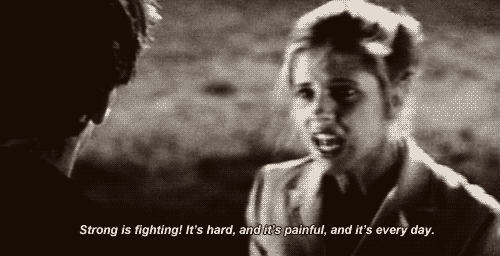Things We Saw Today: Laurie Penny on Fanfiction, Nerd Culture, and Gamergate Is the Best Thing I’ve Read All Year


Sometimes a piece of writing is so good and so powerful and so truth-telling that you just have to get out of its way.
Good Omens actor and better angel Michael Sheen recently tweeted out an endorsement of writer Laurie Penny’s latest essay for Wired. Sheen is one of the few actors who seems to really “get,” support, and indulge fandom, especially unique in his defense of fanfiction. I don’t think I’ve ever clicked on something faster in my life.
Fanfic writers and lovers – this brilliant, beautiful piece by @PennyRed is for you….”because survival is insufficient.” #fanfic https://t.co/GSmjHAlSZL
— michael sheen (@michaelsheen) August 27, 2019
Penny has been a vital voice on the Internet for as long as I can remember; as a journalist and author, she’s carved out an intersecting space of feminism, activism, and online cultural critique. She’s now also working as a screenwriter in Hollywood, most recently for Joss Whedon’s The Nevers, a surreal assignment for someone who cut her teeth on Buffy fanfiction, as she explains in the Wired piece.
“We Can Be Heroes: How the Nerds Are Reinventing Pop Culture”—subhead: “Harry Potter–loving, TV-debating, fanfic-writing enthusiasts have emerged from the underground to dominate—and shape—the mainstream,” is an intensely personal piece as much as it is reflective of wider culture.
Beat one, spring 1999. A small, dark room at the back of a big, old house. A door swings shut on the sound of adults shouting, and an ancient modem wheezes to life. A blue screen illuminates the face of a 13-year-old nerd swaddled in self-important self-loathing and a giant black hoodie. She looks back to check that nobody’s coming before she loads up the page she’s looking for. Something private, and sweet, and just a little bit filthy.
It’s also the story of many of us. I saw my own experience and trajectory—from being a nerdy kid alone with their modem, writing stories set in other worlds and forging communities that way—described exactly by Penny. I sent the story to many similarly-minded friends. Some wrote back that they were crying to see themselves recognized and celebrated. Everyone, without fail, said that the essay had made them feel empowered, powerful, and motivated.
It was through fandom that I learned a more visceral vocabulary of anti-sexism and anti-racism, in literature as well as life. In LiveJournal and other fanfic communities, I learned the lexicon of privilege and structural oppression. I learned that there is a profound connection between the way a person sees the world and the stories they read and write. If you believe that Western imperialism is a net good, you will write one kind of epic space drama. You’ll write a very different kind if you recognize the need for safe spaces and trigger warnings—terms that function not as censorship but as an in-group signal: These are places where trauma is discussed, where we care about others, where everyone has been through something and escaped through the backlit bolt-hole of online fandom to find people just like us.
[…]
What brought fanficcers together was the sense, however softly spoken, of having been disqualified from those grand social myths on the arbitrary basis of gender, or race, or class. But by the mid-2010s, writing by women, queer people, and people of color, many of them emerging young and hungry from the open mouth of the internet, was beginning to dominate the “official” science fiction lists: Charlie Jane Anders, Emily St. John Mandel, Catherynne Valente, Naomi Alderman, Ken Liu, Carmen Maria Machado, Annalee Newitz, Nnedi Okorafor, Seanan McGuire, N. K. Jemisin, and more. Suddenly, most of the best and most feverishly passed-around publications were being written by and, heaven forfend, about people who weren’t stiff-necked white chaps dreaming of war in space.
Penny’s thoughts on fanfiction, fandom, and how those of us involved are now starting to shape a broader pop-culture narrative are fascinating and important. One emerges both hopeful and encouraged. Yet it is her damning evisceration of Gamergate, and the attendant harassment movements comprised of those who think they are defending “their” properties from encroachment, that remains a vital element of this essay I’ll not soon forget:
In 2014, gamers incensed by demands for more diverse storytelling in videogames declared open season on feminists on the internet. An army of comics, fantasy, and TV audiences followed suit, in a howl of outrage against women. Gamergate—and other episodes that were a direct recruiting ground for what is now called the alt-right—were campaigns of harassment organized through shallow channels overflowing with crypto-fascism. The objective was to ruin careers and destroy lives.
Some fans understand culture only as a function of war. They believe that they are brave rebels, trying to take back their beloved fandoms from shambling hordes of social justice warriors, from the ice-army of snowflakes coming to bring endless winter to the summerlands of nerdery. They believe themselves to be the Rebel Alliance, the browncoats, the riders of Rohan, when in fact they are the Empire and always have been.
Anyway, I said I was going to get out of the way on this. Please read the whole thing, and send it to anyone who might need to see themselves reflected in Penny’s poignant mirror.
[We Can Be Heroes: How the Nerds Are Reinventing Pop Culture via Wired, images: 20th television]

Elsewhere in the news:
- MythBusters star Jessi Combs has died during a land-speed record attempt in Oregon. She was 36. (via Syfy)
-
YouTube says stuff like this — shit they know to be false — to obscure what is plainly obvious: the company makes a ton of money off of hate speech. https://t.co/jSIPYsL2jn
— Carlos Maza (@gaywonk) August 28, 2019
- A company testing “anti-groping” stamps to combat train harassment in Japan saw its first batch sell out within minutes. (via CNN)
- This is absolutely horrifying.
The incoming Harvard freshman met an immigration agent on arrival in Boston.
She searched his computer & said his friends had posted political things.
He said that he hadn’t—not one political post on his timeline.
She canceled his visa. And deported him. https://t.co/Gvi3jRqE6n pic.twitter.com/IaNOczmSDy— David Beard (@dabeard) August 27, 2019
- Young climate activists are being targeted with hate, because maybe this world is another planet’s hell. (via BBC News)
- The “adults in the room” with Trump couldn’t handle being there.
Mattis breaks his silence:
“I did as well as I could for as long as I could. When my concrete solutions and strategic advice, especially keeping faith with our allies, no longer resonated, it was time to resign.” https://t.co/Sqxt0xNi4L
— Jonathan Lemire (@JonLemire) August 28, 2019
- “Shock and bore: How Dave Chappelle lost his comic touch” (via The Guardian)
- The U.K. parliament is figuratively on fire, thanks to British Donald Trump hair impersonator Boris Johnson. (via Reuters)
Well, now! Order, order, I say! What did you see out there today?
Want more stories like this? Become a subscriber and support the site!
—The Mary Sue has a strict comment policy that forbids, but is not limited to, personal insults toward anyone, hate speech, and trolling.—
Have a tip we should know? [email protected]
